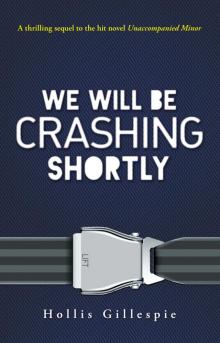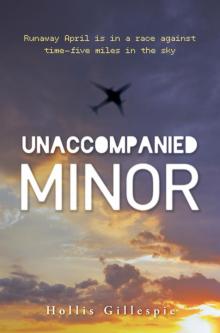- Home
- Hollis Gillespie
Bleachy-Haired Honky Bitch
Bleachy-Haired Honky Bitch Read online
Bleachy-Haired Honky Bitch
HOLLIS GILLESPIE
Tales from a Bad Neighborhood
Dedication
To Daniel Troppy, Grant Henry, and Lary Blodgett
Contents
Dedication
Introduction
Hellish Gargoyle
Suicidal Tendencies
Fear of Dreams
Everybody’s Mother
Changing Values
Poisoned Fish
One Word
Not the End of the World
Stealing Home
The Happiest Man Alive
Curse of Financial Fools
Eight Naked Strangers
The Perfect Father
Drowning
Piercing Experience
The Most Merciless Weapon
Dance of Life
Something Caught
I Can Fly
Big Dix
Bona Fide Fag Status
Welcome to Heaven
I Don’t Swallow
Gay Man Loves Woman
A Jar of Teeth
Nothin’ Harder Than a Preacher’s Dick
Bad Vision
One of Those Nights
Grant Makes It
Putting Out
Fugitives from Bad Credit
A Strange Man
Bleachy-Haired Honky Bitch
A White Father
You Can’t Get Away
A Sign
A Reason to Live
Left Behind
On My Knees
Killer Turkey
A Land That No Longer Exists
Letting Go in Las Vegas
My Mother and the History of Pornography
Hanging on in Zurich
A Pool of Piss
Born-Again Booze Weenie
An Ode to Crappy Cars
Confessions of a Festival Whore
Hell Is a Festival
Lost Things
Bare Breasts
A Dead Cat
A Clean Slate
Ample Breasts Bursting with Desire
In My Head
My Outstretched Hand
The Long Good-bye
It’s All About Safety
Escaping in the New Year
Perilous Climb
Unconnected
The Art of Fooling People
Inner Evil
Rock Bottom
Other People’s Blood
The Dutiful Sister
The Pie Approach
Godless Whore
Freak Like Me
Playing Dead
A Big Shock
Puppy Love
Thank You, Dr. Melkonian
More Inner Evil
Broken
Severed Head in a Sack
Butthole to Hell
I’ve Always Been a Bad Whore
What Are Friends For?
The Road Home
Hot Neighborhood
The Bandwagon
A Bog of Odors
Minor Details
Missing Pieces
My Mother’s Reflection
Myrtle the Lesbian Ghost
The New Ghost
Get Right with God
Jesus Loves Atheists
Acknowledgments
Back Ad
About the Author
Copyright
About the Publisher
Introduction
Thank God you bought this book. Seriously. But even so, to this day I’ve yet to trust the notion it’s not necessary to break your ass to make a buck, so as I write this I’m still employed at my blue-collar job, and my hands are still calloused from lugging stuff. I haven’t thrown away my flight attendant badge and sensible shoes yet and, even scarier, probably never will. The other day my supervisor asked me when I was going to quit, seeing as how I’m a famous writer now and all. I told him, “I ain’t quittin’ ’til they pry the peanuts from my cold, dead fingers, fucker!”
The funny thing is I didn’t know I was writing a book when I started this. Most people have a book lying around in their heads. I, literally, had this one lying around on my closet floor. The chapters were encased in stacks of journals I’d kept while I was going through the complete crap fest that becomes most young adult-hoods fraught with loss and other pain, though with me it started earlier than normal. I don’t think I would have survived if I hadn’t sat down with a pen and paper (laptops were, like, eleven thousand dollars back then), opened an artery, and just let the poison out every chance I got.
Most of those chances came while I was on layovers. I had faked my way into becoming a German translator in addition to my job as a flight attendant, and every week I flew to one of three countries—Germany, Austria, or Switzerland—and it was in those places, absent any good primetime TV or other mental enemas to feed my need for distraction, where the terror of the truth would hit and I’d have to write. It was a compulsion, an awful compulsion. (Please understand, though, this is not a book about flying so much as it is about getting grounded.)
Then two guys, Patrick Best and Steve Hedberg, publishers of Poets, Artists & Madmen in Atlanta, saw something in my stuff, a spark or something, I don’t know. I’m just glad they were looking where I wasn’t. They began running my pieces in their paper, and it all took off from there, especially after Sara Sarasohn, producer of NPR’s All Things Considered, began airing my commentaries on her program.
I should mention that nearly everything in this book is true, so long as truth can be trusted to my recollection. A few names have been changed to protect the guilty, but in truth, most of the guilty not only insisted I use their names but also that I spell them correctly and include their phone numbers.
One more thing: I didn’t really call my supervisor “fucker” that day, because if I had, he could have canned my ass like a truckload of tuna. But because of you and lots like you who bought this masterpiece of mine, I am without a doubt absolutely almost positive, kinda, that it hardly would have mattered. So thank God, and thank you too.
Hellish Gargoyle
If nothing else, at least I’m living up to my name these days, because I just discovered that in German—make that bad German—my first name means “hellish.”
And my last name is even worse. In German, my last name means “gargoyle.” You would think I would have known about this sooner, because I’ve been a bad German interpreter for twelve years now, but you’d be surprised at how long you can interact within another culture and still keep your knowledge of it neatly limited. Take my mother, who was subcontracted to build missiles for the Swiss in the late eighties. We lived in Zurich for two years, and the only German word she learned was ja. She couldn’t even pronounce “Waikiki,” but in my eyes she compensated for her lack of knowledge in this area by the fact that she had a job making bombs.
As an interpreter, my dealings in Germany have mostly been polite business relations, so I’ve never had the need to say the word “hellish” to these people—not unless I was introducing myself anyway.
In front of the Berlin Wall, 1991
You’d think I’d be better at the whole communication thing, considering I’m an official foreign-language interpreter. Fortunately for me I represent people who have no idea I’m using a very broad interpretation of the word “interpreter” to describe my services. As far as they know, I’m translating their words with sparkling precision, but luckily the Germans are pretty tolerant of non-natives who attempt their language, so the interactions usually go off smoothly. Once, an American doctor directed me to ask a German patient when she had had her last bowel movement, and I dutifully turned to the woman and asked her, essentially, “Madame, wh
en was the last time you went to the toilet solidly?”
She answered my question and laughed. My clients must think I am very clever, as I am always making people laugh in their native languages. It is apparently even funnier because I have perfect pronunciation, and I can turn to a German pharmacist and say without a hint of an accent, “It would please me greatly to purchase medicine for my fluid nostrils,” or to a Spanish taxi driver, while searching for the metal end of the over-the-shoulder safety strap, and tell him, “Pardon me, but I am missing the penis of my seatbelt,” or to an Austrian hotel clerk regarding a beautiful fountain nearby, “Is it possible to acquire a room with a view of the urinating castle?”
It must be hilarious to hear these massacred phrases spoken with the determined clarity of a cowbell. People gather around me and ask me to repeat myself. “Tell us again about the storm in your stomach,” they say, after I translate my account of Montezuma’s revenge, “especially the part about your exploding ass.”
I used to be ashamed at what a bad interpreter I was, until I realized that I get my meaning across, and isn’t that the whole point? And there are people out there who actually think I’m good at this. They request me. Every time my work takes me to Europe I still feel giddy, like a stowaway, as if I’ve been able to stave off discovery long enough to fake my way across the Atlantic one more time. Once, while in Munich, I happily hopped along the river’s edge. It was sunny and warm, and I’d just bought a bag of olives at an outdoor market. They were the right kind too—pitted—and I was able to request them by clearly stating, “It would please me to have a hundred grams of the big, boneless black ones.”
The Berlin Wall
My mother in Zurich, 1987
But it fell to a Polish hairdresser to finally enlighten me about my name. I’d been in Munich for a week, participating in a study program that would stuff this half-forgotten, guttural language back into my brain in order to retain my interpreter status, and after class one day I ducked into a salon on Sendlingerstrasse to see if anyone there had time to bleach the hell out of my hair.
I always figured Germany would be a good place to score some good hair highlights. Anyone who’s ever been there can see that all the local women make it their mission to look like they were born and raised on a California beach. Unlike them, though, I actually was born and raised on a California beach, though thirteen years of Atlanta living has seriously eroded my surfer-girl image.
The Polish hairdresser’s name was Barbara, and I didn’t even need an appointment. She simply ushered me to a chair and started slapping some high-test rotgut on my roots. This was my kind of place. In Atlanta, the hairdressers always talk me into new color treatments recently invented by a team of twelve scientists toiling under a glass dome in Finland. The result is usually okay, I guess, but my hair never ends up blond enough. “Can’t we dispense with this fancy crap?” I always ask. “Don’t you have anything back there strong enough to burn the barnacles off a boat?”
American colorists always ignore me and commence their subtle application of a fancy new product. But not Barbara. Barbara’s own hair had been bleached so blonde and so bright that, if you had an idea to gawk straight at her head, it would be safer to do it from under one of those protective helmets that welders wear. Her own German was bad, but better than mine, because at least she knew the meaning of my first name. She laughed when she heard it, “You come from Hell, ja?”
It wasn’t until my scalp was practically bleeding that she finally removed the foils and rinsed the solution from my hair, which, by the way, didn’t fare too well. Much of it had burned off at the roots, leaving little bald patches, and the streaks that remained were as white as lab mice. I would classify the results as less than successful: My scalp looked like it had been bitten by electric eels. I wanted to get out of there fast so that I could assess the damage privately and see if actual sobbing was called for. In my haste, I forgot my umbrella, which prompted Barbara to dash after me down the busy street.
I tried to ignore her but it wasn’t happening. She was calling out my name sweetly, my full name, which she’d read from my credit card, and people were beginning to stop and look around, their curious eyes eventually settling on me. There was nothing else for me to do, so I simply turned and took my place in the world. “Over here, Barbara,” I answered her. She trotted to my side as I stood there, bleach-blond locks and all.
“Hellish Gargoyle,” she smiled, “here you are.”
Suicidal Tendencies
My friend Lary keeps offering to shoot me again, and not like the last time either. This time, he says, he’ll actually put some effort into aiming the gun—at my head, even—and probably not miss. “At the worst you’ll end up a vegetable, but it’s not like you’ll have to be aware of it.”
I’ve stopped bothering to remind him I don’t want to die. Sometimes I still get mad at him for shooting at me the first time. The bullet hit a brick and could have ricocheted into my throat or something, and I might have died horribly, flopping like an octopus in a private ocean of my blood. “You were breaking into my house,” Lary likes to point out. It’s just his reflex, he says, to start shooting when someone shatters his window. I can’t believe that to this day he tries to blame me for his broken window just because I tossed a rock through it.
He’s to blame, of course. If he had a doorbell like a normal person I wouldn’t have to throw stuff at his house to alert him to my presence. He claims he wasn’t really aiming at me anyway, because if he had been, I’d be dead right now, and he would’ve had to bury me in the giant concrete bay he’s building along his property line so he can plant a wall of bamboo stalks to keep all the ice-cream colored houses next door out of sight.
He acts as if it would have been a hassle, a big, huge burden to have to dispose of my body. Does he not remember his own instructions to me in the event of his death? How I’m supposed to push his corpse out of a helicopter at a high altitude with his cat strapped to his chest? On top of that I have to aim for a suburban cul-de-sac because he wants to end up impaled on a swing set. One last fright for the neighborhood kids, he says. Plus, since he doesn’t even care if his cat outlives him, I’m supposed to strap her, scratching and hissing, to his dead chest. Now how’s that for a burden?
Our friends Daniel and Grant, on the other hand, refuse to let me be the executor of their living wills. They know I will never pull the plug, even if there is nothing left but their head in a fishbowl. They’re probably afraid I’ll go senile and beat them with their own feeding tubes until I tire out. Instead, they are each other’s informal executors, with explicit instructions to euthanatize the other when the need for adult diapers comes into play, which I think is excessive. “You might like the diapers,” I try to reason. “Jesus, don’t just die,” I plead, but they just laugh as if they’re looking forward to it.
It’s the burden of it all, I suppose. People have different thresholds for dealing with death, and some have none at all. I think it has to do with your heart, and whether you follow its wishes. I used to work in the copy office of a city magazine alongside three bitter old acid vats who treated me like an unwanted weight because they had to teach me the intricacies of an outdated system that they themselves made sure to keep complicated in order to postpone their own obsolescence. When they weren’t resenting me, they resented one another, and it killed me that I didn’t fit in. The one closest to my age was twice my age, a woman named Eugenia with bulbous, thyroid eyes and a limitless collection of those spangle earrings you buy at bad craft shows.
She’d been working there longer than the lives of a lot of rock stars, and when she left to start her own novelty toilet-paper company (you could order rolls emblazoned with pictures of your ex-boyfriend’s face or the like), she was heralded as if she were an escaped hostage and sent off with a fond farewell that consisted of copious drinking during lunch hour.
But the toilet-paper venture didn’t work out for her. She was back within months, broke
both financially and spiritually. In her absence the editors had learned they didn’t need to replace her, so when she asked to return they fired me to make room. At the time I felt defeated, but I’ve since realized that Eugenia was simply returning to her lair like a sick elephant, because there is more than one way to die, and this was hers. My last image of Eugenia is watching her approach her old desk like it was the electric chair.
I try instead to remember her during her farewell celebration when, in a moment of booze-induced camaraderie, she told me how happy she was to leave the office because she feared she’d be trapped there forever like a corpse in a crypt. Then she brandished a company picture taken more than a decade earlier, when her hair fell long and thick in a braid down her back. The image was a far cry from the liver-spot-mottled, boozy-breath wretch who pinched the photo with her thumb and ring finger to better accommodate the lit cigarette habitually occupying her dried-out hoof. I truly hated her, and she truly hated me, but at that moment she was about to embark on an exploration, choosing to bear the burden of her aspiration rather than let it dissipate without a trace, and I have to respect her for that, because at that moment she was free, free to let the world literally wipe its ass on her dream.
Fear of Dreams
I have to respect Eugenia for that, because one of my biggest fears is going broke. I mean bad broke, like living-in-an-abandoned-truck-on-a-mattress-made-of-old-bathrobes broke. I just don’t know how well I’d fare, having to burn little piles of pet hair and shredded floor mats to keep warm, having to lick the inside of discarded sandwich wrappers to stay alive, having to scrape myself with rusty Brillo pads to abate the itch factor from various parasites. The prospect just looms there in my life, promising such discomfort.
But here’s something funny about fears: They morph. Like last year when I happened across a documentary on that twenty-three-year-old porn star named Savannah, who shot her own head off because she cut her face in a car wreck and thought her career was over. A life like hers would be worse than being broke, not because she was a porn star, which is bad enough (I can’t think of a harder job than having sex, all day, with a succession of penises the size of sewage pipes), but because a team of documentary filmmakers chronicled her entire cocaine-addicted flea-fleck of a life and didn’t come up with a single redeeming moment in it. Not one, just a succession of cockwagging heavy-metal musicians and dickless video directors who had used her like a toilet seat and later talked about how “vulnerable” she was. Even her own mother had only this to say: “I guess she made a good adult-film star.”

 We Will Be Crashing Shortly
We Will Be Crashing Shortly Confessions of a Recovering Slut
Confessions of a Recovering Slut Unaccompanied Minor
Unaccompanied Minor Bleachy-Haired Honky Bitch
Bleachy-Haired Honky Bitch